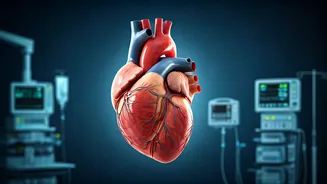Initial Phase Concerns
Following a heart attack, the recovery period is marked by several concerns that require careful attention. Many individuals experience intense fear and
anxiety. One common fear is the possibility of another heart attack. This anxiety can lead to frequent trips back to the hospital for tests, such as electrocardiograms (ECGs), as a 32-year-old heart attack survivor experienced, going almost every other week. This highlights the emotional toll of the experience. It's not uncommon to feel overwhelmed by the need for monitoring and the uncertainty surrounding the future. The initial phase underscores the importance of a comprehensive recovery plan that addresses both physical health and mental well-being.
Navigating Recovery Journey
The journey back to health after a heart attack is multifaceted, involving medical interventions, lifestyle adjustments, and emotional support. Recovery frequently necessitates ongoing medical evaluations. These evaluations are essential to ensure the heart's proper functioning and to monitor for any complications. The patient often undergoes various tests to assess cardiac health and the need for further intervention. Beyond medical care, lifestyle changes are a critical element. This involves adopting a heart-healthy diet, regular physical activity, and avoiding habits like smoking. Mental health support is equally vital. It addresses the psychological impact of the heart attack, including anxiety, depression, and post-traumatic stress. Support groups and counseling can provide valuable assistance during this challenging period.
The Importance of Tests
Regular medical check-ups and diagnostic tests are integral components of post-heart attack care. These measures help monitor heart function, detect any potential issues, and tailor the treatment plan to the individual's needs. The frequency and type of tests can vary. This is determined by the patient's condition, the severity of the heart attack, and the presence of any other health concerns. Tests like ECGs, echocardiograms, stress tests, and blood tests are standard procedures. They help identify blockages, assess the heart's pumping ability, and evaluate overall health. These tests are essential to ensure patients are on track in their recovery and to adjust treatment accordingly. Early detection of potential problems through regular testing can prevent serious complications.
Identifying Risky Symptoms
It's essential for heart attack survivors to be vigilant in recognizing potentially dangerous symptoms. Awareness of such symptoms allows for prompt medical intervention, which can significantly impact the outcome. Some alarming signs include chest pain or discomfort, which might be a sign of angina or even another heart attack. Shortness of breath, even during light activities, could indicate that the heart is struggling to function efficiently. Excessive fatigue, unusual sweating, or dizziness could also signify a problem. Experiencing palpitations, irregular heartbeats, or swelling in the legs or ankles are additional warning signs. Recognizing and reporting any of these symptoms to a healthcare provider without delay is critical. This could help prevent further damage to the heart and avoid potentially life-threatening complications.













